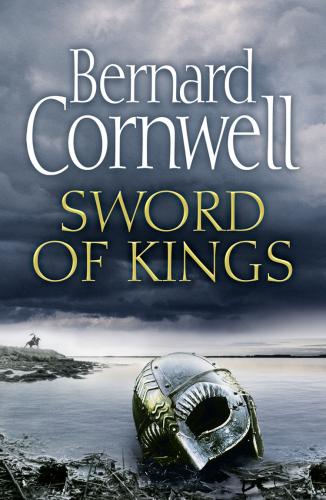Gydene was missing.
She was not the first of my ships to vanish. The savage sea is vast and ships are small and Gydene, which simply meant ‘goddess’, was smaller than most. She had been built at Grimesbi on the Humbre and had been named Haligwæter. She had fished for a year before I bought her and, because I wanted no ship named Holy Water in my fleet, I paid a virgin one shilling to piss in her bilge, renamed her Gydene, and gave her to the fisherfolk of Bebbanburg. They cast their nets far offshore and, when Gydene did not return on a day when the wind was brisk, the sky grey, and the waves were crashing white and high on the rocks of the Farnea Islands, we assumed she had been overwhelmed and had given Bebbanburg’s small village six widows and almost three times as many orphans. Maybe I should have left her name alone, all seamen know that you risk fate by changing a ship’s name, though they know equally well that a virgin’s piss averts that fate. Yet the gods can be as cruel as the sea.
Then Egil Skallagrimmrson came from his land that I had granted to him, land that formed the border of my territory and Constantin of Scotland’s realm, and Egil came by sea as he always did and there was a corpse in the belly of Banamaðr, his serpent-ship. ‘Washed ashore in the Tuede,’ he told me, ‘he’s yours, isn’t he?’
‘The Tuede?’ I asked.
‘Southern shore. Found him on a mudbank. The gulls found him first.’
‘I can see.’
‘He was one of yours, wasn’t he?’
‘He was,’ I said. The dead man’s name was Haggar Bentson, a fisherman, helmsman of the Gydene, a big man, too fond of ale, scarred from too many brawls, a bully, a wife-beater, and a good sailor.
‘Wasn’t drowned, was he?’ Egil remarked.
‘No.’
‘And the gulls didn’t kill him,’ Egil sounded amused.
‘No,’ I said, ‘the gulls didn’t kill him.’ Instead Haggar had been hacked to death. His corpse was naked and fish-white, except for the hands and what was left of his face. Great wounds had been slashed across his belly, chest and thighs, the savage cuts washed clean by the sea.
Egil touched a boot against a gaping wound that had riven Haggar’s chest from the shoulder to the breastbone. ‘I’d say that was the axe blow that killed him,’ he said, ‘but someone cut off his balls first.’
‘I noticed that.’
Egil stooped to the corpse and forced the lower jaw down. Egil Skallagrimmrson was a strong man, but it still took an effort to open Haggar’s mouth. The bone made a cracking sound and Egil straightened. ‘Took his teeth too,’ he said.
‘And his eyes.’
‘That might have been the gulls. Partial to an eyeball, they are.’
‘But they left his tongue,’ I said. ‘Poor bastard.’
‘Miserable way to die,’ Egil agreed, then turned to look at the harbour entrance. ‘Only two reasons I can think of to torture a man before you kill him.’
‘Two?’
‘To enjoy themselves? Maybe he insulted them.’ he shrugged. ‘The other is to make him talk. Why else leave his tongue?’
‘Them?’ I asked. ‘The Scots?’
Egil looked back to the mangled corpse. ‘He must have annoyed someone, but the Scots have been quiet lately. Doesn’t seem like them.’ He shrugged. ‘Could be something personal. Another fisherman he angered?’
‘No other bodies?’ I asked. There had been six men and two boys in the Gydene’s crew. ‘No wreckage?’
‘Just this poor bastard so far. But the others could be out there, still floating.’
There was little more to
